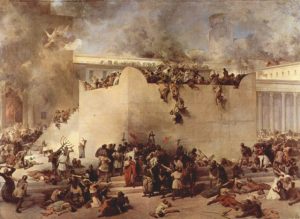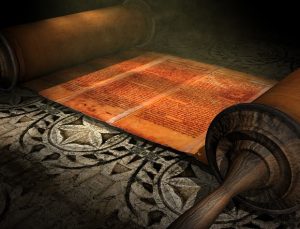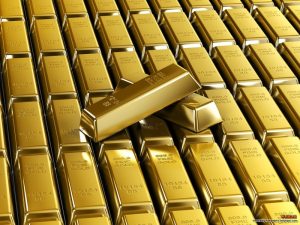Devorim 2019: Too Much Gold?
by devadmin | August 8, 2019 5:26 pm
 Raboyseyee and Ladies,
Raboyseyee and Ladies,
Too Much Gold?
Welcome to Sefer and Parshas Devorim, the last of the five books which make up the heylige Toirah. Soon enough we will be completing yet another cycle of Toirah reading only to begin again come Simchas Toirah. Who decided that the Toirah should be broken down into five books? Is the Toirah itself divided into five scrolls? It’s not: it’s but one big scroll. As to who decided to make five books, ver veyst, ober, it’s seemingly an accepted part of our mesoira (tradition) that five is the magic number, and we assume that whomever was behind the idea was properly credentialed. Ober where is it so written? And the answer is nowhere. Shoin! The division of the heylige Toirah into five books is not mentioned anywhere, yet –according to most sources- this division may be ancient and inherent. Seemingly such division harkens back to the 2nd Beis Hamikdash (Second Temple), the destruction of which we observe this coming Sunday on Tisha Be’ov nidcha. Avada you all know that we also mourn for the loss of the 1st Temple, ober, somewhere along the line, our sages felt bad for us and thankfully combined both solemn days into one. A bit more history before we explore the first posik of the parsha. Already by the early first millennium C.E., the heyligeToirah became known by the Greek name, Pentateuch which literally translated means “five scrolls.” Is this division due to practical, thematic, or symbolic considerations? The Greeks named the books of the Toirah and we accept their names?
 As it turns out, the heylige Toirah, though written on one scroll, is comprised of many pieces of parchment which are then sewn together by a soifer (scribe) who dips into the mikveh daily in order to purify himself before sewing and writing. Moreover, as written (in the instructions found in the Shulchan Arukh, Yoreh Deah 273, there is a 4-line break between each of the holy books. That being said, the heylige Toirah is taka comprised of five different books, sewn together, each so named by goyim.
As it turns out, the heylige Toirah, though written on one scroll, is comprised of many pieces of parchment which are then sewn together by a soifer (scribe) who dips into the mikveh daily in order to purify himself before sewing and writing. Moreover, as written (in the instructions found in the Shulchan Arukh, Yoreh Deah 273, there is a 4-line break between each of the holy books. That being said, the heylige Toirah is taka comprised of five different books, sewn together, each so named by goyim.
The first time the Greek word “Pentateuch” is used in reference to the Toirah is the middle of the second century C.E., in a Greek epistle written by the Gnostic Christian philosopher Ptolemy to a female believer named Flora wherein he questioned the Toirah’s authorship. Shoin: Ironically then, the first reference to the Pentateuch of Moses is found in a letter denying that he wrote it. Oy vey!The bottom line: The English names for each of the Toirah’s five book are actually Greek, and like the rabbinic names of Bereishis, Shmois, Vayikra, Bamidbar and Devorim, they describe the contents. The common names for the books come from a significant word in the beginning verses of the book. Another bottom line: nowhere does the RBSO tell Moishe that the heylige Toirah is to be divided into five books, ober we can imagine that back then, writing the entire Toirah onto one book must have been challenging. We can also imagine that our sages foresaw the day when dedications would be sold by various publishing houses and decided that selling five individual books would produce significantly more revenue than the sale of but one long scroll. Veyter!
Anyway, this past shabbis, as the shul was listening to the elongated parsha of the week –two of them- the Oisvorfer, as is his practice each shabbis, was already looking ahead to see which posik or incident to focus on for the week. Ober he got stuck on the very first posik of the parsha and let’s then begin by reading that verse. Says the heylige Toirah (Devorim 1:1) azoy:
“These are the words that Moishe spoke to all of Israel on the east bank of the Jordan River… near Poron Toifel, Lovon, Chatzeyrois, and Di Zohov.”
Moishe’s speech, the first of three he will deliver before he passes away later in the book of Devorim, wants us to know his exact location form where he spoke. And the questions that bothered the Oisvorfer are azoy: why do we need to know the precise location of his orations? Since when does the heylige Toirah provide such information? Moishe has spoken to the Yiddin hundreds if not thousands of times for the past 40 years but does he ever before tell us his exact location or which places were nearby? Moreover, a number of exegetes note that these places do not exist on any geographical map! Moishe mentioned places that don’t exist? Mamish? Was he talking in riddles? Why then mention them with such specificity and especially so if they don’t exist? What’s taka pshat? And for a moment in time, the Oisvorfer thought he was onto something big. Ober that euphoric feeling left him as soon as he read Rashi who was -centuries earlier- seemingly also bothered by the same questions. Let’s find out what he and a few others had to say about the mentioned locations.
Says Rashi relying on what our holy sages explained years before Rashi took to writing, azoy: each of the names of places mentioned above held a special meaning in Moishe’s speech. Each was intended to be a veiled rebuke to those listening. Limoshol (by way of example), ‘Di Zohov’ was not really a place but a reminder. Of what? Of the sin of the eygel (Golden Calf). What has the golden calf have to do with a place known as DiZohov? Shoin; the word for gold is zohov, and just like that, our sages declared that DiZohov refers to gold, and by extension,to the golden calf where the Yiddin sinned with avoido zoro and some lewd sexual activity. And says Rashi citing the medrish (SifriDevarim1): all “these words” Moishe spoke are words of reproof of the Yiddin meant to admonish them over all the places in which they caused anger before the RBSO. Ober is that it? Over their forty-year stint in the midbar, were these taka the only places where the Yiddin sinned?
 Says the medrish: Di Zohov could be read as “daizohov” — meaning“enough gold.” How much gold is enough? We will get back to that in a moment.
Says the medrish: Di Zohov could be read as “daizohov” — meaning“enough gold.” How much gold is enough? We will get back to that in a moment.
And if Di Zohov is but a veiled reference, an allegorical reference to some historical event, then it also stands to reason that each other place mentioned in the first posik above, was an allegory to a specific sin the Yiddin committed over their forty-year midbar excursion. Poron was a reference to the miralgim (spies), incidentally a sin that vexed Moishe until his dying day, and one he speaks about somewhat differently in our parsha than the way we lead the myseh back in parshas Shelah. Ober that for another day. Recall the Yiddin were sent from the wilderness of Poron to spy on the land. Toifel and Lovon allude to the people’s complaints about the Mun, they were tired of the same daily menu. Chatzeyrois is where Koirach’s rebellion took place, and Di Zohov, as mentioned above, and translated literally, means an abundance of gold, and is a veiled reference to the sin of the Golden Calf. Does Di Zohov mean enough, or an overabundance of gold?
Ober listen to this: According to one opinion, however, the name Di Zohovis not just a place,and not just a reminder of bad behavior specifically the sin of the golden calf- but also an expression indicating justification for the behavior of the Yiddin and especially so with their involvement with the golden calf. Are you confused? Let’s review: according to Rashi and others, Di Zohov is a reference to their sin with the calf, ober according to others, it’s a defense argument: the Yiddin sinned and were guilty but with an explanation. What taka is Di Zohov? Says the heylige Gemora (Brochis 32a) so mamish very gishmak azoy. We need to read the words as would an attorney. How does an attorney read words written in plain English, or in this case, holy words of the Toirah? The same way! By twisting them to meet his needs! And according to this pshat, Moishe in the last 35 days of his life, became an attorney and represented to the Yiddin on that day of his speech that the sin of the eygel (golden calf) was not of their own making; it was not their fault. Whose fault was it? The RBSO’s! OMG and say it’s not so please. Moishe turned the tables and was now blaming the RBSO for the sin of the golden calf? Was he already senile at this point? Was he angry at the RBSO for cancelling his visa and now lashing out? What’s pshat? Says the Tana d’Vei R. Yanai, azoy: Moishe said this to the RBSO: ‘Master of the World! It is because of all the silver and gold that You showered upon the Yiddin — until they said, Dai! (Enough)] — that is what caused them to make the Golden Calf.’ In plain English: You spoiled them rotten with gold and silver and as a result they turned to sin. In other words: too much gold and silver can lead one to sin and other lewd activities.
Ober how could this be? Who has too much gold and silver? Do you know anyone who has enough gold, silver and or stam azoy money, and refuses therefore to accept more? And despite the old axiom which states that ‘less is more’, only an idiot believes that to be true. When it comes to gold and money, more is definitely more! Let’s get real: the RBSO planted within the human soul the incessant drive to always seek more. Says Shlomo Hamelech (King Solomon) (Ecc. 6:7). Azoy: “The soul will never be sated” This drive also compels us regarding material acquisitions: “One who loves silver never has his fill of silver” (Ecc. 5:9).
Why then would the Yiddin say they had enough? Says one medrish that pshat is azoy: ever since leaving Mitzrayim and throughout their forty-year midbar experience, the RBSO took care of all their physical needs. Munn came from the sky, water from a well-rock, clothing never wore out, shoes lasted forever, and let’s not forget that the Midianites and Moabites also provided hot shiksas for their other needs, if you chap, which they did. The soul’s natural drive for material things, including gold, was artificially suppressed. And when the RBSO showered them with more silver and gold than they could ever need, their response was, dai, enough!’
Attorney Moishe then argued azoy to the RBSO: The Yiddin’s miraculous existence in the midbar, may have stifled their soul’s natural desire for more. Dependent upon gifts from Heaven, lacking challenges and goals, they became satisfied and indolent. And this impacted their spiritual aspirations.Since their natural drive to advance was weakened, the Yiddin turned to more easily attainable spiritual goals. And this is what led them to the Sin of the Golden Calf.This aberrant form of spirituality suited a people with limited aspirations. And this Moishe argued, this Di Zohov, was the culprit. Precisely because of all the silver and gold that You showered upon the Yiddin, is what caused them to lower their sights and worship the eygel. If this is taka pshat, Moishe literally took his life in his hands by putting forth this argument to the RBSO. And taka he did as 35 days later he was dead. Was there a connection? Perhaps! Let’s read that first posik one more time. – “These are the words which Moshe spoke to all of Israel across the Jordan…..”
Says the Abarbenel so gishmak, azoy: the words “devorim” may be read as an allusion to a “devora”– a bee. The meaning of this allusion is that just as a bee dies after it stings, similarly, Moishe died just after he concluded “stinging” the Yiddin. The entire 5th book of Devorim consists of several discourses given by Moishe to the Yiddin just before his death. In all, some of his words include harsh condemnation for the wrongs they committed over the course of their sojourn through the wilderness. And once Moishe finished “stinging” the people with his occasionally harsh words, he left this world, and thus his addresses to the people are referred to as “devorim,” a term which alluded to a bee.
On the other hand, says the Yalkut Yehudah, it’s faraket (opposite was true): Moishe felt pained when he criticized the Yiddin. The fact that he, like a bee, died after “stinging” the people is symbolic of the fact that throughout the process he felt pained by having to reprimand the people whom he loved and cared for so much.
Which is it and the lesson? If phat is that Moishe was pained by having to rebuke the Yiddin, the takeaway is that words of criticism must be spoken with the utmost sensitivity and compassion. When we need to call someone out for poor behavior, to criticize, we must not relish the opportunity to point out somebody else’s faults and present ourselves as superior. We’re all sinners in some way, and as the Oisvorfer enjoys saying from time to time “don’t judge me because I sin differently than do you.” Few of us have 100% clean hands and it’s more often the case than not that those who enjoy chastising and bad-mouthing have the dirtiest. Let us not play the role of moral guardian. We must instead recognize the shame and unease our words cause the other person, and, to whatever extent possible, try to feel the emotional pain that we are inflicting. Gishmak thought as Tishe Be’ov approaches and we mourn the loss of the Temples which were -according to our sages- lost as a result of sinas chinom (baseless hatred), people not getting along.
If on the other hand, pshat is that Moishe was trying to blame the RBSO for giving the Yiddin too much gold – let’s recall they left Mitzrayim with gold and silver, more washed up when the Mitzrim drowned, and according to some, the munn (manna) was delivered encrusted with gold, then Moishe was taka playing with fire and the bottom line would be azoy: we are taking our lives into our hands when we blame the RBSO for our misdeeds.
A gittin Shabbis and again, an easy fast!
The Heylige Oisvorfer Ruv
Yitz Grossman
Source URL: https://oisvorfer.com/devorim-2019-too-much-gold/
